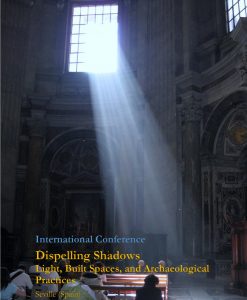Dispelling Shadows: Light, Built Spaces, and Archaeological Practices
 Call for papers for the International Conference
Call for papers for the International Conference
Dispelling Shadows
Light, Built Spaces, and Archaeological Practices
Dates: 20-21 February 2020
Location: Departamento de Historia del Arte. Facultad de Geografía e Historia. Universidad de Sevilla. C/ María de Padilla s/n. 41004. Sevilla. Spain.
General Coordinator: Pedro Luengo. Universidad de Sevilla (Spain).
News:
- A report of the Dispelling Shadows conference in the News section
Co-organization:
- Lambros T. Doulos. National Technical University of Athens. Greece.
- Dorina Moullou. Ministry of Culture and Sports. Greece
- Costas Papadopoulos. Maastricht University. Netherlands.
- Rebeka Vital. Shenkar. Engineering. Design. Arts, Israel.
Organizers:
- ARKWORK. Cost Action CA15201. Archaeological practices and knowledge work in the digital environment.
- Universidad de Sevilla (Spain)
Abstract
Light, both natural and artificial, as an element of past lives and practices, has been considered within a broad spatial and temporal frame, including European architecture from the 13th to the 18th century, prehistoric cave art, Egyptian temples, Mesopotamian domestic spaces, Byzantine churches, working environments and dwellings of classical antiquity, Inuit domestic spaces, industrial buildings, and Chacoan landscapes. However, it still remains an under-researched aspect of archaeological practices due to the insufficiency of existing methods to provide a concrete way of dealing with complex, intangible, and often ambiguous data.
Experimental and experiential approaches, e.g. ethnography, experimental archaeology, anthropology, provide the means to problematise how light influenced the use and perception of diverse environments. However, in an attempt to develop a more nuanced understanding of how people in different periods, from prehistory to modern times, have experienced, perceived, and used their environments, scholars from different disciplines have increasingly started using and developing analytical tools that have the potential to develop a novel theoretical and methodological framework to approach natural and flame illumination.
The conference aims to bring together scholars and practitioners working across fields and disciplines to discuss recent development in tools, methods, theories, and technologies to deal with light in archaeological and heritage environments. In this respect, the conference will not deal with particular case studies but with broader theoretical, technical, and methodological considerations of the topic. Areas of interest include, but are not limited to:
- How is light currently considered in archaeological knowledge work? Is it an aesthetic factor, a theoretical framework and/or a methodological approach?
- How archaeological practices and knowledge work relating to light could be informed by analytical frameworks in adjacent fields such as architectural history, art history, and digital humanities?
- How a better understanding of light in the context of archaeological knowledge production can inform the work and practice of curators, heritage managers and associated professions, and improve the perception, understanding, and presentation of heritage sites?
Publications
Special Issue: The organisers intend to publish selected, peer-reviewed papers of the conference in a special journal issue.
Whitepaper: During the conference, participants will also co-author a whitepaper about digital approaches to lighting studies in archaeology and beyond, exploring current challenges and potential futures.
Invitation
One presenter of the best paper proposal will be reimbursed supported by the organization committee.
Submissions
Proposals should be original, not submitted for consideration to another conference, or under review for publication and should be a significant contribution to the topic.
They must be sent to pedroluengo{[at]}us.es by December 1st 2019, including:
- Title
- Author Name(s)
- Institutional affiliations and addresses, including email and contact number
- Keywords (5-10)
- Abstract (1000 – 1500 words, divided into Introduction, Background/Context, Methodology, Analysis/Discussion, Conclusion)
- References
Presentations will be a maximum of 15 minutes followed by questions and a panel discussion. All accepted presentations can be submitted for consideration to be included in the final publication. All submitted papers will undergo a blind peer-reviewing process.
Important dates
- Deadline for submission of abstracts: 1 December 2019
- Acceptance notification: 15 January 2020
- Deadline for final papers: 15 February 2020
